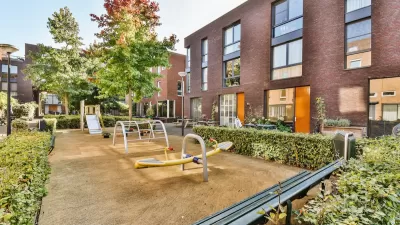With the Millennial boom in many urban centers, many cities are looking for ways to retain young families rather than losing them to the traditional suburban exodus. One columnist dares to ask: Do cities even need kids?
If you've ever wanted to read sentences like "Children: Are they necessary?" in a non-Onion, national media platform, now's your chance. A new article, written by Lydia DePillis for The Washington Post, asks if designing and building child-friendly cities is more trouble than it's worth.
DePillis cites a 2001 study that quantified the burden of children compared to benefit of the singles: "Back in 2001, two scholars at the Brookings Institution put a price tag on that dichotomy. A two-parent family with two kids costs $6,200 annually, and a childless couple generates a net gain for the city of $13,000."
Then there are the negative consequences on inequality once wealthy families decide to stay in the city: "Professional families will only move to a neighborhood if they’re assured a spot in a quality school — but that locks out those who can no longer afford it." Successful schools, it seems, are a harbinger for gentrification.
The column includes more details on the arguments for why children can be so troubling to a city's bottom lines, and a policy recommendation from DePillis.
FULL STORY: It’s hard to build cities for kids. But do they really need them?

Maui's Vacation Rental Debate Turns Ugly
Verbal attacks, misinformation campaigns and fistfights plague a high-stakes debate to convert thousands of vacation rentals into long-term housing.

Planetizen Federal Action Tracker
A weekly monitor of how Trump’s orders and actions are impacting planners and planning in America.

In Urban Planning, AI Prompting Could be the New Design Thinking
Creativity has long been key to great urban design. What if we see AI as our new creative partner?

King County Supportive Housing Program Offers Hope for Unhoused Residents
The county is taking a ‘Housing First’ approach that prioritizes getting people into housing, then offering wraparound supportive services.

Researchers Use AI to Get Clearer Picture of US Housing
Analysts are using artificial intelligence to supercharge their research by allowing them to comb through data faster. Though these AI tools can be error prone, they save time and housing researchers are optimistic about the future.

Making Shared Micromobility More Inclusive
Cities and shared mobility system operators can do more to include people with disabilities in planning and operations, per a new report.
Urban Design for Planners 1: Software Tools
This six-course series explores essential urban design concepts using open source software and equips planners with the tools they need to participate fully in the urban design process.
Planning for Universal Design
Learn the tools for implementing Universal Design in planning regulations.
planning NEXT
Appalachian Highlands Housing Partners
Mpact (founded as Rail~Volution)
City of Camden Redevelopment Agency
City of Astoria
City of Portland
City of Laramie





























